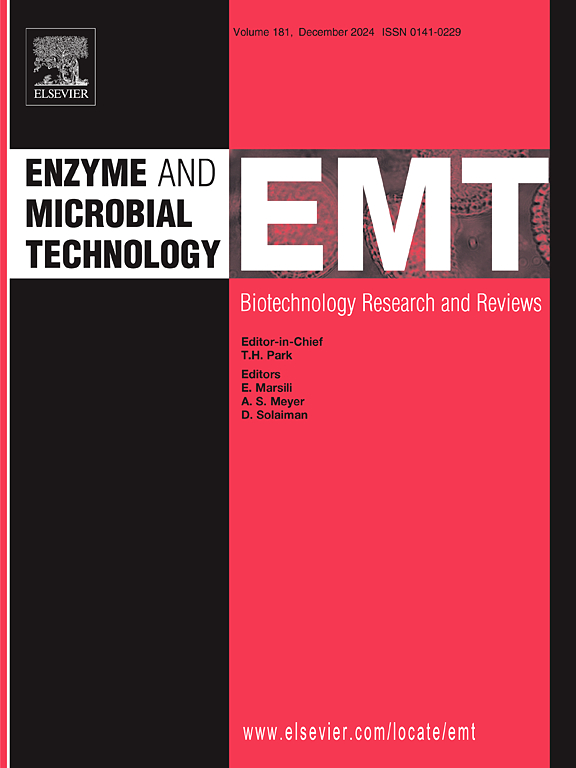Targeted metagenomics – Enrichment for enzymes active on sulfated polysaccharides from seaweeds
IF 3.4
3区 生物学
Q2 BIOTECHNOLOGY & APPLIED MICROBIOLOGY
引用次数: 0
Abstract
Seaweeds (macroalgae) are an attractive resource for diverse microbial- and enzymatic production processes. They are abundant, underutilized, cheap, and rich in carbohydrates, and therefore have the potential to be used as a source of mono- or oligosaccharides, and as substrates for industrial fermentation processes. Many seaweed polysaccharides, including the sulfated polysaccharides ulvan and fucoidan, are however complex and heterogenous in structure, and there are currently few enzymes available to modify them, and understanding of their enzymatic depolymerization remains limited. The present study aimed to identify and characterize robust fucoidanases and ulvan lyases. Metagenomes were obtained from microbial enrichments from an intertidal hot-spring, genes identified that expressed putative fucoidanases and ulvan lyases, and following gene cloning and expression, the respective enzymes were screened for enzymatic activity. Consistent with their origin, the identified protein sequences were considerably divergent from previously characterized enzymes, with a 44 % average maximal sequence identity. In total, the study resulted in the characterization of 10 new fucoidanases (GH107 and GH168 families) and 8 new ulvan lyases (PL24, PL25 and PL40 families). Notably, the new fucoidanases appeared to have functional specificity towards fucoidan containing α-1,3 linked L-fucosyl and several functioned at high temperature. The study contributes a metagenomics-based approach to identify new seaweed polysaccharide degrading enzymes and an increased understanding of the diversity of such enzymes, which may have implications for the realization of biotechnology based valorization of seaweed biomass.
靶向元基因组学 - 从海藻中富集硫酸化多糖活性酶
海藻(大型藻类)是一种具有吸引力的资源,可用于多种微生物和酶生产工艺。海藻资源丰富、利用率低、价格便宜且富含碳水化合物,因此有可能被用作单糖或寡糖的来源,以及工业发酵过程的底物。然而,许多海藻多糖(包括硫酸化多糖乌饭子和褐藻糖胶)结构复杂,种类繁多,目前可用来修饰它们的酶很少,人们对其酶解聚合作用的了解仍然有限。本研究旨在鉴定和描述强健的褐藻糖胶酶和乌尔凡酶。研究人员从潮间带温泉的微生物富集物中获得了元基因组,确定了表达假定褐藻糖胶酶和乌尔凡裂解酶的基因,并在基因克隆和表达之后,对相应的酶进行了酶活性筛选。与它们的起源相一致的是,鉴定出的蛋白质序列与以前鉴定出的酶有很大差异,平均最大序列同一性为 44%。这项研究总共鉴定出了 10 种新的褐藻糖胶酶(GH107 和 GH168 家族)和 8 种新的溃疡酶(PL24、PL25 和 PL40 家族)。值得注意的是,新的褐藻糖胶酶似乎对含有α-1,3-L-岩藻糖基的褐藻糖胶具有功能特异性,其中几种还能在高温下发挥作用。这项研究提供了一种基于元基因组学的方法来鉴定新的海藻多糖降解酶,并增加了对此类酶多样性的了解,这可能对实现基于生物技术的海藻生物质增值具有重要意义。
本文章由计算机程序翻译,如有差异,请以英文原文为准。
求助全文
约1分钟内获得全文
求助全文
来源期刊

Enzyme and Microbial Technology
生物-生物工程与应用微生物
CiteScore
7.60
自引率
5.90%
发文量
142
审稿时长
38 days
期刊介绍:
Enzyme and Microbial Technology is an international, peer-reviewed journal publishing original research and reviews, of biotechnological significance and novelty, on basic and applied aspects of the science and technology of processes involving the use of enzymes, micro-organisms, animal cells and plant cells.
We especially encourage submissions on:
Biocatalysis and the use of Directed Evolution in Synthetic Biology and Biotechnology
Biotechnological Production of New Bioactive Molecules, Biomaterials, Biopharmaceuticals, and Biofuels
New Imaging Techniques and Biosensors, especially as applicable to Healthcare and Systems Biology
New Biotechnological Approaches in Genomics, Proteomics and Metabolomics
Metabolic Engineering, Biomolecular Engineering and Nanobiotechnology
Manuscripts which report isolation, purification, immobilization or utilization of organisms or enzymes which are already well-described in the literature are not suitable for publication in EMT, unless their primary purpose is to report significant new findings or approaches which are of broad biotechnological importance. Similarly, manuscripts which report optimization studies on well-established processes are inappropriate. EMT does not accept papers dealing with mathematical modeling unless they report significant, new experimental data.
 求助内容:
求助内容: 应助结果提醒方式:
应助结果提醒方式:


